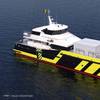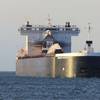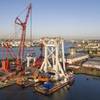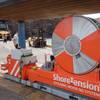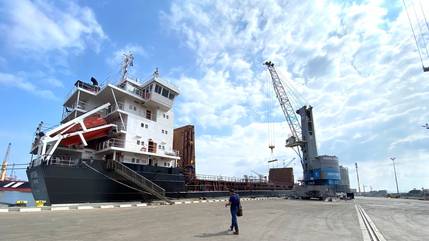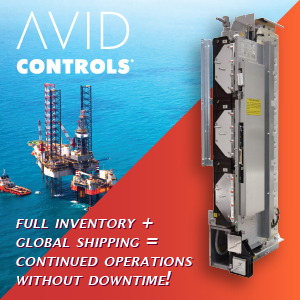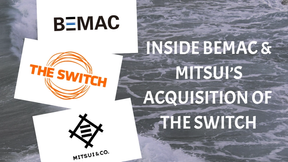Rotterdam port's throughput almost stable
The Port of Rotterdam’s throughput in the first quarter of 2014, at 109 million tonnes, was 0.2% below the level for the corresponding period last year.Split up by goods type, less crude oil (-2%), mineral oil products (-14%) and other liquid bulk cargo (-14%) were transferred. On the positive side, iron ore and scrap (+5%), coal (+15%), agribulk (+69%), other dry bulk cargo (+13%), containers (+1%), roll on/roll off (+9%) and other mixed cargo (+9%) did better.
CEO Allard Castelein of the Port of Rotterdam Authority said, “The falling tendency of the second half of 2013 continued initially, but thanks to a strong month in March, the throughput in the first three months nonetheless stayed almost the same. For the whole of 2014, I am counting on slight growth, but my attention will mainly be on structural developments that are putting the Port of Rotterdam under pressure. These include the over-capacity in the European refinery sector, the rapid rise in American shale gas that is putting investments in the European chemicals sector under pressure, and changes in the containers sector. Shipowners are building ver-larger container ships and starting to cooperate intensively to fill them optimally. At the same time, extra terminal capacity has been built in many Northwest European ports while economic growth has lagged behind. Together with customers and stakeholders, we are working to rise to these challenges.”
Liquid bulk
The throughput of liquid bulk increased by 8% to 49 million tonnes. Deliveries of crude oil fell by over 400,000 tonnes, equivalent to the cargo of one-and-a-half very large tankers, to barely 24 million tonnes. This level was as expected, given the low occupancy levels, around 70%, of the West-European refineries. The cause of this is the continuing low demand for refinery products in Europe, and increasing competition from refineries outside Europe. The delivery and shipment of mineral oil products decreased by 2.8 million tonnes to 18 million tonnes. The throughput of gas oil remained constant, but that of naphtha, petrol and kerosene and the shipment of fuel oil declined in comparison with the same period in 2013. Because the prices in the short term are higher than those in the longer term (‘backwardation’), storing products is not profitable. This leads to lower occupation levels in the tank terminals. The handling of other liquid bulk cargo fell by over a million tonnes to 7 million. The transfer of chemical
basic products, around 60% of ‘other liquid’, fell, due partly to lower production from the refineries. Vegetable oils and biofuels were also loaded and discharged less.
Dry bulk
The total throughput of dry bulk cargo increased by 15% to 23 million tonnes. The delivery of ore rose by over 9% as a result of further concentration of ore supplies for European steel plants via Rotterdam. From here, the ore is forwarded in smaller seagoing vessels to Bremen and Dunkirk and by inland shipping to places including Ghent.
The transfer of coal rose by almost one million to eight million tonnes. The majority of this growth was to do with low transfer in March last year, while the average transfer in the first three months of this year remained reasonably stable. Late last year, more was bought in due to uncertainly about supplies from Colombia. Due to the mild winter, no extra supply of energy coal occurred in the winter months. The throughput of agribulk increased strongly by 1.1 million tonnes as a result of growth in maize throughput from Ukraine.
The handling of other dry bulk (building materials, minerals, biomass) realised a growth of almost 400,000 tonnes to 3.5 million tonnes. This suggests a more favourable outlook in the construction, metals and chemicals industries.
Containers, general cargo
Container throughput rose in tonnes by over one per cent to a good 30 million tonnes, and remained equal in units: 2.9 million TEU. This growth involved both deep-sea (supply from/shipment to Asia and North America) and the short-sea market. The transit to the Baltic Sea countries also increased through relocation of transshipment cargo from other ports to Rotterdam. The delivery and shipment of short-sea containers to/from the Baltic Sea countries and the UK increased due to economic growth in those countries. The Ro-ro traffic improved by 9% (400,000 tonnes) thanks to the improving British economy. The throughput of other mixed cargo (steel, non-ferrous metals, paper, fruit, project cargo) also rose by 9% (over 100,000 tons). This increase mainly involved non-ferrous metals and project cargo.



